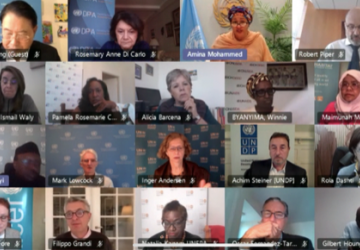Gearing US$5 billion for countries, UN leaders pledge to boost efforts to save lives and livelihoods and recover better from COVID-19

New York, 5 November 2020 – The United Nations Sustainable Development Group (UNSDG) met virtually today to assess preliminary results and challenges of joint work supporting 162 countries and territories to overcome and recover better from the COVID-19 pandemic. The group members – the chiefs of all UN entities working on sustainable development – focused on the socioeconomic response to COVID-19. So far, UN teams repurposed around US$3 billion of existing funding, while additionally mobilizing nearly $2 billion to support national and local efforts in the immediate response to the pandemic.
In the last quarter alone, UN teams supported authorities to deliver nutrition programmes to almost 5 million people, with 7 million women receiving maternal health services, while ensuring the continuation of close to 6 million ongoing vaccinations. Results are tracked by an online public COVID-19 data portal. UN chiefs vowed to do more, including to boost data collection with national and local authorities as critical means to address those most at need. The efforts were guided and strengthened by a series of COVID-19 policy briefings issued by the UN Secretary-General, as well as the key global initiatives he has launched in response to the effects of the crisis – including on the financing of the COVID-19 response, and his calls for Peace at Home and towards a ceasefire across the globe.
“For the first time, we all recognize this is a development emergency of global proportions. Governments, communities, and citizens have mobilized accordingly – and our UN teams too have stepped up, together, from the onset of the pandemic to address the health, humanitarian and socioeconomic needs. In many ways this is an expression of global solidarity and response to the most vulnerable. But much more needs to be done, even faster,” said Deputy Secretary-General and UNSDG Chair Amina J. Mohammed.
From the onset of the pandemic, UN teams have been rolling out the United Nations Framework for the immediate socio-economic response to COVID-19, which calls for protecting jobs, businesses and livelihoods to set in motion a better recovery of societies and economies as soon as possible for a more sustainable, gender-equal, and carbon-neutral path— better than the “old normal”.
This work is amplified by the Secretary-General’s “Recover Better Fund”, or COVID-19 Response and Recovery Fund, launched in early April to catalyze joint actions by UN Country Teams. In nearly 50 countries, the Fund has financed programmes to address health needs, protect people and help economies recover. Interventions have helped procure critical supplies, build infrastructure, and provide health and basic services to those heavily impacted by the pandemic. Some interventions created employment and reskilling opportunities through the local production of personal protective equipment. In Guinea, one intervention resourced and employed 500 local artisans to produce 62,815 masks, while another provided resources to six SMEs, which produced 150,000 reusable masks. In The Gambia, UN teams procured 60 containers and 60 hospital beds, while in Belize two new isolation facilities are 80 per cent complete.
UN leaders warned of a considerable funding gap to effectively rollout countries’ socio-economic response plans. Moreover, countries’ ability to “recover better” from COVID-19 will, to a large extent, depend on the development of a vaccine and ability to fully resume economic activities.
Principals also took stock on the well-advanced reforms of the United Nations development system, while discussing adjustments to their working modalities to ensure the group can, collectively, continue to strengthen strategic guidance and support to country operations as teams support countries recover from COVID-19 and accelerate action towards the SDGs.
Note to editors
COVID-19 Data Portal - Other preliminary results from from the COVID-19 Data Portal tracking the UN’s socioeconomic response to the pandemic, include:
- Over 4.5 million were reached with critical water and sanitation supplies. This includes 450,000 persons with disabilities and 300,000 migrants, refugees, stateless persons or internally displaced people. Disaggregated data remains crucial to our promise to leave no-one behind.
- In the last quarter, the UN supported over 77,000 formal sector workers, 30,000 informal sector workers, and 40,000 companies (33,000 of which were micro, small or medium enterprises).
- The data shows UN country teams work with a diverse sets of stakeholders. For example, over 600 employers and business organizations and 250 trade unions have been supported. Likewise, over 300 national-level and 700 sub-national dialogues have been facilitated.
- 127 UN teams reported that they have repurposed existing funding to support national and local authorities’ efforts to tackle the pandemic. So far, around $30 million was repurposed per UN team, totaling almost $3 billion for the current programming cycle of UNCTs.
About the UNSDG: UN Sustainable Development Group serves as a high-level forum for joint policy formation and decision-making. It guides, supports, tracks and oversees the coordination of the UN’s development operations in 162 countries and territories. The UNSDG meets twice a year under the chairmanship of Deputy Secretary-General Ms. Amina J. Mohammed, who chairs the UNSDG on behalf of the UN Secretary-General. The UN Development Programme (UNDP) Administrator, Mr. Achim Steiner, serves as Vice-Chair of the Group. View a full list of UNSDG entities here.













